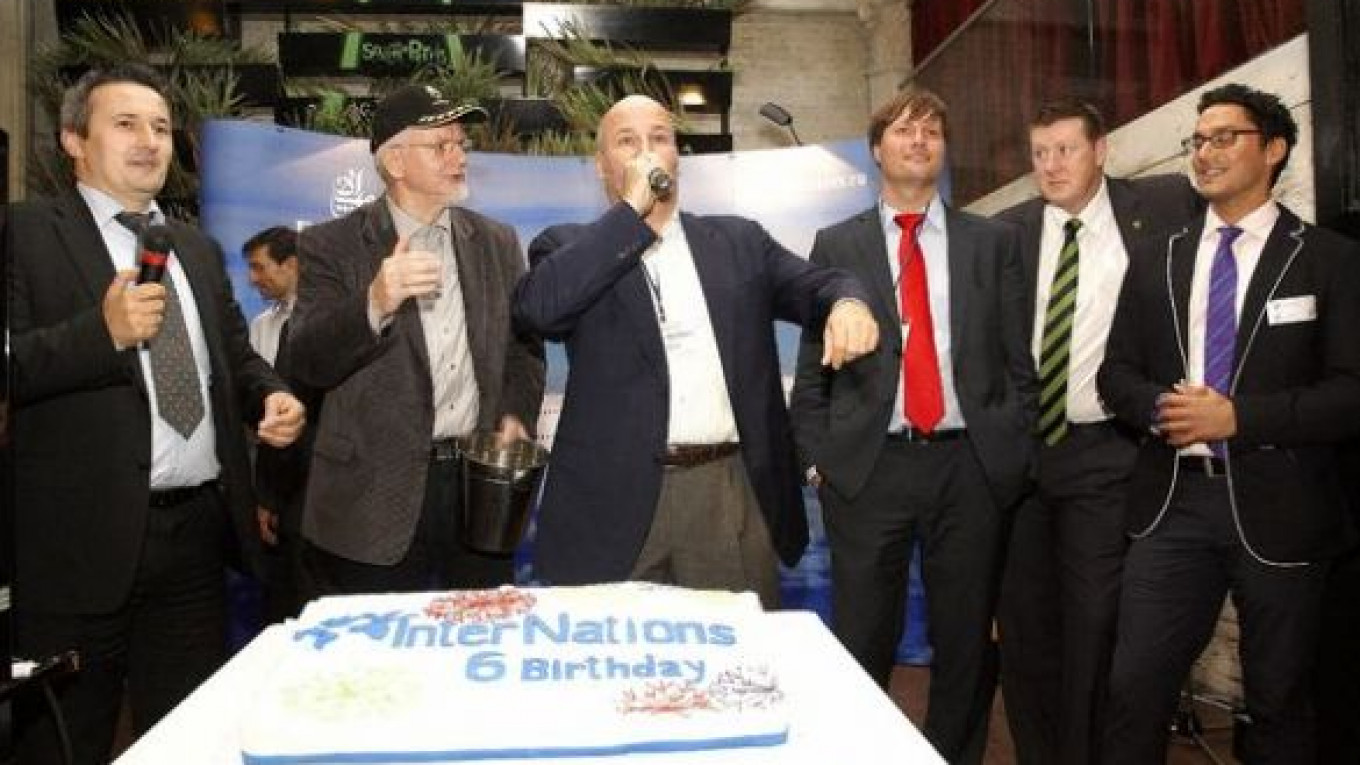As long as there have been expats in Moscow they have sought out places to meet and associate with other foreigners, forming established meeting places and societies to discuss their common interests. Now, a new social network is proving remarkably successful at organizing a certain segment of Moscow's large foreign population and giving them a chance to socialize.
Moscow's expats have traditionally had few places to socialize: From the limited confines of embassies and Intourist hotels during the Soviet Union, a huge array of "expat-friendly" bars and clubs have sprung up over the past 20 years as Moscow's expat population has skyrocketed. Similarly, social networking has expanded possibilities to meet people outside of one's immediate friends and work colleagues.
InterNations is a web platform that aims to harness the potential of social networking to allow members to better integrate with their local expat communities. The Munich-based group was founded six years ago and aims to make it easier for expats to acclimatize to their new surroundings.
On the InterNations website users can join communities based on which city they are located in, enabling them to go to events hosted by the community or reach out to individual members in their local community. Once a community reaches a certain size, volunteers called ambassadors are recruited to help organize events and reach out to newcomers.
"When I started the events here, we had 389 members in Moscow … today we are well more than 13,000 in Moscow," said Moscow InterNations ambassador Peter Richter. Richter described how the monthly gatherings had gradually grown from intimate groups of 40 to 50 into large parties of several hundred.
"It is focused on mingling, people getting to know each other … and of course, some manage to do some business networking, you pull out the business cards," Richter said, describing the InterNations meetings.
While most InterNations communities have only one general meeting each month, Richter said the Moscow community would soon start hosting a second, more interactive event, recognizing that the community here is one of the largest InterNations community worldwide.
Apart from the official events organized by ambassadors, the InterNations web platform allows users to organize their own smaller events and groups organized around shared interests. For example, the Moscow InterNations community has groups for language exchange, photography enthusiasts, dating, and Indian food, among many other subjects.
Mingling at a recent Moscow InterNations event, it was evident that the official events attract roughly equal shares of Russians and foreigners. Many Moscow expats report that Russian InterNations members are almost all women and that the foreigners are almost all men, though the crowd at events attended by The Moscow Times did not seem to correspond quite so neatly to this stereotype.
A surprisingly large number of attendees at recent InterNations events reported that they were participating for the first time, showing perhaps both continuing growth in the InterNations community as well as in the expat community in general. The language spoken was predominantly English, though the many Russians present were very pleased to speak Russian with anyone who showed even a small level of comprehension.
As for the expats present, they were a diverse crowd: Europeans and Americans predominated, with British, French and Germans among the most numerous European nationalities. The community seemed to largely reflect the makeup of the Western expat population, with few foreigners from the states of the former Soviet Union present. Contingents of Turks and also Indians and Pakistanis were noticeable at the meeting
As the InterNations ambassador said, the Moscow event was fairly social and focused on light conversation, without the heavy-handed emphasis on business networking found at some InterNations events in the U.S. That said, a journalist from The Moscow Times had amassed a sizable collection of business cards by the end of the night.
To a certain extent, participants seemed to naturally gravitate into small clusters based on background and occupation — American businessmen could be seem talking to other American businessmen, and a journalist from The Moscow Times found himself meeting a succession of other journalists. However, most people at the event were generally open and curious and not averse to strangers barging into their conversation and introducing themselves.
As the InterNations community continues to grow in Moscow, the many ways to participate will only grow. While InterNations events do charge a cover fee, much of this is paid back in the form of free drinks and a meal. The website offers two tiers of membership, with free membership allowing access only to official events and a limited number of group events, while Albatross members, who pay a small monthly fee, have access to the full site and get discounts on events.
For more information on events and membership, see the InterNations website at internations.org.
Contact the author at [email protected]
A Message from The Moscow Times:
Dear readers,
We are facing unprecedented challenges. Russia's Prosecutor General's Office has designated The Moscow Times as an "undesirable" organization, criminalizing our work and putting our staff at risk of prosecution. This follows our earlier unjust labeling as a "foreign agent."
These actions are direct attempts to silence independent journalism in Russia. The authorities claim our work "discredits the decisions of the Russian leadership." We see things differently: we strive to provide accurate, unbiased reporting on Russia.
We, the journalists of The Moscow Times, refuse to be silenced. But to continue our work, we need your help.
Your support, no matter how small, makes a world of difference. If you can, please support us monthly starting from just $2. It's quick to set up, and every contribution makes a significant impact.
By supporting The Moscow Times, you're defending open, independent journalism in the face of repression. Thank you for standing with us.
Remind me later.






